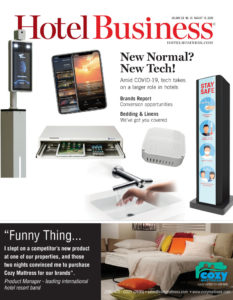 Uncertainty seems to be the word on everyone’s lips these days: “We can’t do that because of the uncertainty of the future.” And yes, our industry is in the most precarious position it’s been in for the 30-plus years I have worked in it. However, all human history is riddled with uncertainty. It isn’t the first time we have faced it and it won’t be the last. What’s different this time is that we have wholesale, full-scale, bought the lie.
Uncertainty seems to be the word on everyone’s lips these days: “We can’t do that because of the uncertainty of the future.” And yes, our industry is in the most precarious position it’s been in for the 30-plus years I have worked in it. However, all human history is riddled with uncertainty. It isn’t the first time we have faced it and it won’t be the last. What’s different this time is that we have wholesale, full-scale, bought the lie.
When the towers fell, when the market crashed, we still believed our industry would recover. We made our adjustments and righted the ship—but we still went on. We fundamentally believed because our industry is filled with optimists.
This time, however, it feels like we’ve stopped believing (I’ll wait a moment while you sing that song). We’ve adopted the mindset that this is the end of the world as we know it (again, I’ll wait while you sing along).
In conversations with customers and with colleagues, all I hear is, “We hope things will get better.” When I ask what they are doing to prepare for things to get better, they fall back to the uncertainty. “We can’t do that because we are uncertain if it will work/if there is business/when the recovery will start.” To quote a wise former boss (who is now a bigwig over at Hyatt), hope is not a business strategy.
The reality is that recovery has started. If you are hoping, and not doing, recovery is going to pass you by, and uncertainty is going to become a reality. As an industry, it’s time that we find our grit and realize that if we sit back and only hope, we are going to let our industry die.
If you doubt me about the recovery, you need only to look at your weekly STR report. Over the last few weeks, the U.S. has averaged occupancies hovering around 47.2%, the top 25 around 40.2%, and all other markets at 50.2%. While most of this is transient business, it is a sure sign that group is returning to the market.
Get back to key business strategies
Alas, if hope is your primary business strategy, then that group business is not likely booking at your hotel. It is likely being booked at the hotels that are still out there hustling. So, what is your hotel doing?
Working at the front desk, while important, is not a valid answer. It’s time to get your team back in the trenches. That may mean bringing team members back or it might simply mean putting your current salespeople back to selling. If you don’t, there is a real chance they will get stuck in the inertia that is uncertainty.
Inertia is a powerful force. There is a reason it’s Newton’s first law. But for those of you who didn’t study physics: An object at rest stays at rest and an object in motion stays in motion. Or more simply put, stop selling, stop generating a profit.
Let’s unpack the concept of selling. Selling is not responding to an inbound lead—that’s paperwork. Selling is the act of persuading someone on the merits of your value proposition. That’s what your team needs to be out there doing. Talking to accounts, persuading them to use your hotel instead of others. Travel is occurring; your team needs to be out there convincing accounts your hotel is safe for their travelers.
Today that might only be transient business but, soon, it will also be group business. If your team isn’t out doing it, your competition is. Which means, by the time you get around to doing it, you won’t have your choice of business; you’ll be stuck with what’s left over. All the chaff left behind from those who hustled. In this economy, imagine how bad that’s going to be and what you will have to do to get it.
Do the hustle
While we might all want to blame COVID-19 (it’s an easy target), our inertia started long before the world stood still. Our sales teams stopped selling because the business walked in the door (OK, through our computers). Now when we need those skills, they have atrophied from inertia. Combine that with our uncertainty and the loss of hope and we have the perfect storm.
That’s a lot of gloom, but deep down you know I’m right. If you doubt me, take a bit of time to analyze your team’s activities over the last few years. How much business was “hunted” vs. “found”? You probably won’t have to dig too deeply to uncover the truth. So how do we fix it?
It’s time to kick-start your sales processes. Your sales teams need to have sales goals and I don’t just mean revenue goals. Start easy. Raise your hands if you remember sales call goals. I’ve been around long enough to remember having to make a certain number of calls per week. Fifty calls per week broken into a multitude of categories: new accounts, maintenance calls, follow-up calls, etc.
When I first started in sales, I thought it was the most ridiculous thing. Then, slowly, I noticed when I made the calls, the pipeline built. When I slacked off a bit so did the pipeline. Eventually, as I grew in my career and started to oversee other hotels, it was always the first metric I reviewed. My hotels with the strongest activity numbers were always the hotels with the highest revenue numbers. Once I could instill the habit in my struggling hotels, the revenue numbers followed.
It never failed, even at subpar hotels (from a quality perspective). They could outperform a comp set because they outhustled everyone else. And, it always started with activity metrics. The revenue would almost always take care of itself if the team was hustling.
This hustle becomes even more important during economic upheaval (although I would argue hustle should be agnostic to the economic times). During downtimes, the relationship with accounts becomes more important, as everyone competes for less business. Suddenly, those hotels that are up in class are going after the same business you are. The only chance to win against those hotels is to be the person who has always been there for the account. Do you believe your hotel has that type of relationship with any account?
Chances are there might be one or two. But to survive, maybe even succeed, you are going to need more than one or two. You might need twenty or thirty. That’s what your team needs to be doing. Finding those 20 or 30 accounts and creating relationships that connect, persuading them about the merits of your hotel relative to everyone else. That begins and ends with activity.
The title of this article says it all. Uncertainty, hope & inertia: The lies we believe.
But here’s the real truth: Uncertainty is not your adversary. It’s a simple fact; embrace it and plan for how you are going to battle it.
Hope is a betrayer because too often we get wound up in the hope and forget to act. Then our inaction leads to loss of hope, otherwise known as despair.
Inertia is the enemy. It’s what keeps us locked in destructive habits and resistant to change.
The best solution for all three of these is action. Start doing! Start selling! Start producing! If you don’t, someone else will and you’ll be left with their castoffs.
Kristi White is VP, product management, for Knowland. She has two decades of experience in the hotel and revenue management side of the industry, and has a pulse on the needs of hospitality group business. She has advised hundreds of hotels worldwide on improving their business strategy, hotel performance and overall profitability.

